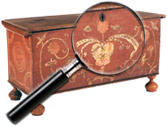|
|
George Herbert Baker (1878-1943)
A member of the “Indiana School” of painters in the early 20th century, George Herbert Baker was born in 1878 in Muncie, Indiana. He studied at the Cincinnati Art Academy and earned a number of prizes for his exhibits in the Hoosier Salon, Muncie and Richmond (Indian) Art Association, and at the 1930 Indiana state fair. In addition to oils, Baker worked frequently in watercolors and pastel.
Baker was closely [...] Click here to continue reading.
The Bagnall Family of Clockmakers
Benjamin Bagnall is generally considered to have been Boston’s first clockmaker, where he worked from about 1710 to 1740. Benjamin learned his craft as an apprentice to Peter Stretch, a clockmaker in Philadelphia from about 1690 to 1740.
Benjamin’s two sons, Benjamin Jr. and Samuel, were also clockmakers. Samuel worked in Boston from about 1740 to 1760. Benjamin Jr. worked in Philadelphia, Newport and Providence, Rhode Island. In 1770 [...] Click here to continue reading.
The Bien Edition of Birds of America
Considered rare, the Bien edition is perhaps the least well documented of the major editions of John James Audubon’s landmark Birds of America. It was the first attempt to reproduce the birds life-size. The Bien sheets with one image measure about 26″ by 38″, the same size as the Havells. However, instead of placing one small bird on a large sheet, as in the Havell edition, two [...] Click here to continue reading.
Associated, by Association, Married
Where the context does not refer to a matrimonial relationship, these are polite trade terms to indicate that one or more parts of the piece in question have different origin.
Katya Apekina
Katya Apekina was born in 1959, Moscow, USSR. She received Master of Ceramic Arts degree from Stroganoff School of Applied Arts in 1983. Apekina and her family currently reside in the United States. Her work, always bright, radiant, and hopeful, presents her artistic view of Jewish life, past and present.
“I enjoy doing ceramics because it is a synthetic art – it combines form, color, texture and adds an unexpected component of [...] Click here to continue reading.
Ansonia “Swinging Arm” Clocks
Made in the 1880′s by Ansonia Clock Co. of New York, these distinctive clocks consisted of a classical female metal figure holding aloft a clock (usually of ball-form, but occasionally having a brass barrel-form) with a metal swinging pendulum and a brass, spring-driven, eight-day movement. These clocks were originally purchased by jewelry stores as window displays to attract the attention of potential customers and were made in a series of [...] Click here to continue reading.
Aluminum Group
Introduced by Herman Miller in 1958, the Aluminum Group was designed by Charles and Ray Eames and initially envisioned as indoor-outdoor furniture. However, the focus soon shifted solely to indoor furniture.
The Aluminum Group features an aluminum frame which was covered in a variety of materials, including leather and fabric, often in a design that used 1.875″ ribs.
The initial design used a seat frame supporting a stretched synthethic mesh, which [...] Click here to continue reading.
Allen & Bro., Cabinetmakers, 1847-1902
In 1847, brothers William Allen, Jr., and Joseph Allen took over their father’s business as a purveyor of exotic woods and furniture. William Sr. founded his firm in 1835 and located it at 1209 Chestnut Street in Philadelphia, Pennsylvania. By 1847 the firm had moved to 137 Walnut Street and included sons William and Joseph. In 1869 Joseph partnered with another Allen brother, James, and solidified a reputation for [...] Click here to continue reading.
Helen Allingham (1848 to 1926)
Helen Allingham was born Helen Mary Elizabeth Paterson in Swanlincote, a small village in Derbyshire, England, the oldest of seven children born to Alexander Henry Paterson, a physician, and his wife Mary Chance Herford. Early on, the Paterson family moved to Altrincham, Cheshire, where Dr. Paterson established a prosperous practice and his daughter’s talent for art began to develop under the guidance of her grandmother Mary Herford and her [...] Click here to continue reading.
Cosmo Alexander (Scottish, American, 1724 to 1772)
Alexander was the son of Scottish portraitist John Alexander. Cosmo traveled throughout Europe before coming to America in 1766. In America, he also traveled widely, from Newport south to Charleston. He is most well-known for taking a young Gilbert Stuart as an apprentice while in Newport.
Information courtesy of Garth’s Auctions, November 2010.
|
Recent Articles
- Charles Alfred Meurer – American Artist & Tromp L’Oeil Artist
- Sendak, Maurice – American Artist & Writer
- Godie, Lee – American Artist
- Davis, Vestie – American Artist
- Bartlett, Morton – American Artist
- Mackintosh, Dwight – American Artist
- Evans, Minnie Jones – African-American Artist
- Mumma, Ed (Mr. Eddy) – American Artist
- Nice, Don – American Artist
- Savitsky, John (Jack) – American Artist
- Gordon, Harold Theodore (Ted) – American Artist
- Dial, Thornton – African-American Artist
- Doyle Sam – American Artist
- Johnson, Lester Frederick – American Artist
- Finster, Howard – American Artist
|
|
